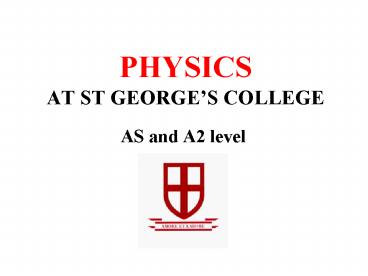PHYSICS AT ST GEORGE - PowerPoint PPT Presentation
1 / 11
Title:
PHYSICS AT ST GEORGE
Description:
Why Study Physics? To satisfy our curiosity. Why is the sky blue? How do mobile phones work? To help us to understand the world around us ... – PowerPoint PPT presentation
Number of Views:231
Avg rating:3.0/5.0
Title: PHYSICS AT ST GEORGE
1
PHYSICS AT ST GEORGES COLLEGE
- AS and A2 level
2
Why Study Physics?
- To satisfy our curiosity
- Why is the sky blue?
- How do mobile phones work?
- To help us to understand the world around us
- How was the Universe formed?
- Why do things fall down?
- To enable us to participate in and help to
forward advances in technology - e.g. Quantum Physics led to CD Players
- To have fun!
3
At University
- A2 level Physics is required for Engineering
Physical Science courses - AS level Physics would be recommended for
Medicine and any Science course - For any other course, A2 AS level Physics is
treated as a serious academic qualification
4
Physics Careers
- Direct uses of Physics include
- academic research, computing, opto-electronics,
telecommunications, motor vehicle technology,
power generation, medical physics, meteorology
etc... - A Physics qualification is valued in
- medicine, finance, marketing, business
management, teaching etc...
5
GCSE Grades Required
- In order to study Physics successfully at AS or
A2 level you need to have gained at IGCSE or GCSE
level - Physics A
- OR
- Double Award Science AA
- Most successful students would have A grades.
6
AS Overview
- We undertake the Physics A specification of the
AQA Examination Board - At AS level there are three modules
- Two theory papers, Unit 1 Unit 2 (2 x 40)
- Plus Unit 3 consisting of in-laboratory practical
tasks (20) - Groups are usually taught by two Physics teachers
7
AS Unit 1
- Consists of
- Particle Physics e.g. quarks antimatter
- Quantum Physics e.g. wave-particle duality
- Electricity extending from GCSE work
- This is assessed through an externally marked
written paper of length 75 minutes
8
AS Unit 2
- Consists of
- Mechanics e.g. projectiles Newtons laws
- Material Physics e.g. the Young Modulus
- Waves e.g. diffraction interference
- This is assessed through an externally marked
written paper of length 75 minutes
9
AS Unit 3
- This is internally assessed through laboratory
practical assignments - This extends work covered at GCSE into How
Science Works - Includes areas such as data processing and the
evaluation of results
10
The A2 (A-level) Modules
- This course is taken in the upper sixth year
- At A2 level there are three modules
- Two theory papers
- Unit 4 Fields Further Mechanics (40)
- Unit 5 Nuclear Thermal Physics
- plus an optional topic (40)
- Unit 6 consisting of in-laboratory practical
tasks (20)
11
More Information
- Ask for a handout
- Ask me ! (Mr. K Taggart)
- The Physics Department Website at
www.ktaggart.co.uk































